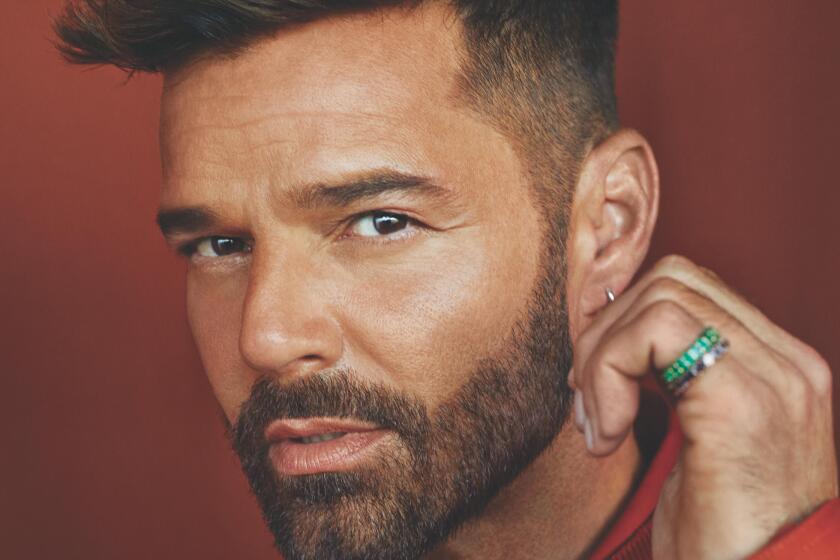Road to Redemption Includes O.C. Concert : Eric Burdon Is Battling the Blues
As leader of the Animals, Eric Burdon pursued the sound and feeling of blues and R&B; authenticity more single-mindedly than almost any other star of the mid-’60s British rock invasion.
That Burdon found what he was looking for is evident in those old Animals hits, many of them reworkings of blues and soul standards that helped lead American fans of the British rock phenomenon back to their own country’s fertile musical roots.
A quarter of a century after the Animals scored a No. 1 hit by breathing a fresh sense of dread and damnation into the old folk-blues “House of the Rising Sun,” the blues are still very much with Burdon.
But instead of fueling hit songs, Burdon’s 1980s blues only reflect a deep sense of frustration bred from a series of balked attempts at reigniting his career.
“I live from one disaster to another,” Burdon, who will be 48 next month, said by phone recently from Hollywood, where he was rehearsing his band for a national tour that brings him to the Coach House in San Juan Capistrano tonight.
“The only way I can prove I’m worth anything is to get on the road and perform for live audiences. They let me know I’m still alive.
“Not a very happy story,” he summed up. “I wish I could tell you a different one, but that’s about it.”
Burdon’s steady, gravelly tone didn’t beg sympathy as he recounted a succession of recent career mishaps. Instead there was an edge to his reflections, a sense that time and trouble haven’t subdued the smoldering assertiveness that Burdon brought to such Animals hits as “It’s My Life,” “Don’t Let Me Be Misunderstood” and “We Gotta Get Out of This Place.”
Burdon’s most concentrated effort at regaining the mass public’s notice was a 1986 autobiography, “I Used to Be an Animal, but I’m All Right Now.” From what Burdon says about the book, though, it barely did appear.
“My hopes were that people would read it and it would get to the marketplace. I feel filled with despair when I get continual phone calls and letters, requests from people on the road: ‘I heard about your book, man. Where can I get it?’ I don’t even have a copy of it myself because I’ve given away every copy I had.”
(The British pressing of 10,000 copies sold out, according to Joanna Mackle, publicity director for the book’s London-based publisher, Faber & Faber. A spokeswoman in the publishing house’s U.S. office said American sales are approaching 10,000 copies.)
In any case, Burdon said, most of “I Used to Be an Animal” had disappeared before the book ever saw print. For that he blames Peter Townshend of the Who, the rock star who now and then puts down his guitar in favor of an editor’s pencil at Faber & Faber.
“I figured with Pete Townshend at the helm I’d have a shot, (but he was) more like hatchet man than editor. You don’t have to be connected to the literary world to see there are these leaps and gaps in it. I wrote 240,000 words, and 200,000 words were thrown out the window.”
The book is a disjointed, unsurprising narration of the usual ‘60s excesses of sex and drugs and rock ‘n’ roll, long on surface reminiscing but short on depth, detail, perspective or reflection. Burdon says that he wrote a complete life history, but that Townshend’s cuts lopped off his story with the death of Burdon’s friend, Jimi Hendrix, in 1970.
Missing, Burdon said, are such tidbits as the genesis of the Animals’ name: It wasn’t intended as a cute reference to the wild kingdom, he said, but as a tribute to a British World War II veteran, nicknamed Animal, whom Burdon had known as a youngster.
“He was one of the most engaging characters I’d ever met, but his mind was blown,” Burdon said. “He raped a girl at gunpoint during the British occupation of Cypress, and after that he couldn’t handle life anymore. It blew his mind.
“Townshend said, ‘We can’t print that. We might offend women readers.’ I feel pretty bitter about it. (Townshend) did me a great disservice. He kept me boxed in the ‘60s, where I’m safe, not alive in the ‘80s at all.”
Burdon said he thinks that his lack of rapport with Townshend on the book project may have had its seeds in the ‘60s, when the Who were favorites of Britain’s trendy, upscale Mods, while the Animals were more in league with the Mods’ scruffier working-class antagonists, the Rockers.
“(Townshend) was the vanguard of the Mods. I always considered myself a Rocker,” said Burdon, the son of a Newcastle electrician. “Through the experience of the book, I came to realize we hadn’t changed our stripes at all.” Townshend, who handles book projects in between his musical endeavors, could not be reached for comment.
Burdon’s most recent attempt at ‘80s career revival was an album, “I Used to Be an Animal,” geared to coincide with the book. Released last year on the obscure Striped Horse label (which Burdon said has since folded), it found Burdon in strong voice on energetic songs ranging from straightforward rock and R&B; to rap-flavored funk. The album, like the book, did a quick vanishing act.
“There wasn’t much interest” from bigger labels, Burdon said, “and that’s why I went with an independent for the first time. It was the only choice I had at the time, and I’m still confronted with that problem. I hope this tour will open somebody’s ears and get me another deal.” Burdon said he has also continued to write, working on screenplays and a biography of Jimi Hendrix.
Last year, Burdon moved to La Quinta, near Palm Springs, after sojourns in Spain and West Germany. He continues to tour with the same four-man backup group of London-based musicians that he has worked with for the last 3 years. West Germany remains one of his favorite stops.
“It’s one country where I feel appreciated,” Burdon said. “The people allow me to keep a grip on the sort of reality I want to have for myself. I want to achieve the same thing here. This is the big challenge, the big country.”
In England, Burdon said, he has been a pariah since the early ‘70s, when he got in trouble after giving a stoned, emotional interview on the BBC following the death of Hendrix.
“The week Jimi died, that’s the last time I played in England, except for guest appearances with the Animals. It’s OK for me to be an Animal, but as Eric Burdon, I’m persona non grata . People in England talk to me like I’m the walking dead: ‘Eric Burdon--I thought you were dead.’ My only answer is, ‘Come to one of my gigs and I’ll show you whether I’m dead or not.’ ”
Financially, at least, it would seem that Burdon could bring his career to life by reconvening the Animals and joining the lucrative rock oldies circuit (in his book, Burdon says that the first time ‘round, business scams robbed the Animals of their earnings).
“I’d rather stay where I am and call my own shots and keep my own identity,” he said. A 1983 reunion tour and album with the band’s original lineup convinced him that, although he used to be an Animal, he had better avoid becoming one again.
“I didn’t want to do (the reunion) in the first place, but everyone from my lawyer to my mother was saying, ‘Go on, give it a shot.’ I figured, ‘If you can’t communicate with old friends, what’s the use?’
“But it was probably the worst experience of my life. By the time I got to America, we were trading blows physically. Whatever feelings I had for those guys were lost in that tour, and nothing’s worth that.”
This leaves Burdon today in much the same position as some of the old blues figures he emulated as a young man: largely ignored but still gamely singing and playing, with memories of setbacks, disappointments and squandered opportunities as a constant reminder of just what the blues are about.
Burdon takes that assessment as a compliment, not a sad irony. “When I run into those old blues cats and hear what they have to say . . . I’m quite proud to be judged that way.”
Eric Burdon plays at 8 tonight at the Coach House, 33157 Camino Capistrano, San Juan Capistrano. Tickets: $19.50. Information: (714) 496-8930.
More to Read
The biggest entertainment stories
Get our big stories about Hollywood, film, television, music, arts, culture and more right in your inbox as soon as they publish.
You may occasionally receive promotional content from the Los Angeles Times.







